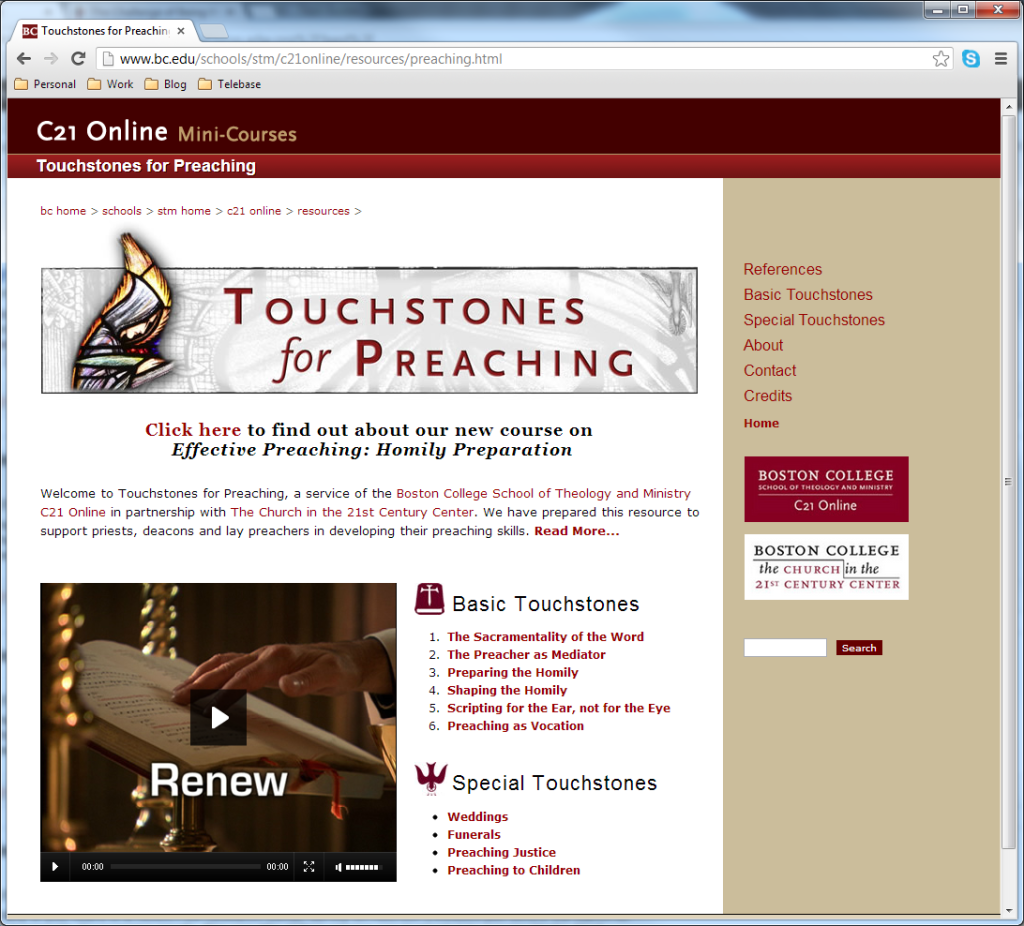The View From The Pew
The homily given by the priest during the Catholic liturgy is incredibly important. Unfortunately, the homily is often one of the primary topics about which Catholics (and particularly former Catholics) complain.
“The ministry of the Word…among which the liturgical homily should hold pride of place…is healthily nourished and thrives in holiness through the Word of Scripture”
– Dei Verbum, 24
Unfortunately, it is often said that the homily is often unintelligible, boring, uninspiring and unrelated to real life.

Our priests certainly have a challenging task assigned to them. They should therefore receive our support and constant prayers. We should listen carefully to each homily, attentive to what God wishes to teach us, each one of us, through His minister. When I returned to the Church, I was often humbled by listening to a homily and being shocked by the gold that was there for the taking, if only I had ears to hear.
However, in today’s post I would like to do something a little brave and suggest some practical ways in which the typical liturgical homily could be enhanced. I know I’m in a bit over my head here. I am not a priest, nor have I been trained in homiletics, but as a Catholic layman, over the course of my life thus far, I have heard over 2,000 homilies. So, for what it is worth, drawing upon my experiences from my side of the pulpit, here are my top ten suggestions for the preachers of the Word…
1. Don’t worry about the length
I have heard excellent homilies which have been short, lasting only a few minutes, and I’ve heard excellent homilies which have lasted over half an hour. Having said that, shortening any presentation typically has the effect of focussing and refining the material. If a message has been successfully communicated in ten minutes, there’s no need to pad it for another five.
“Too often it happens that ornate sermons which receive the applause of crowded congregations serve but to tickle the ears and fail utterly to touch the hearts of the hearers”
– St. Pius X, Acerbo Nimis
2. Explain the Readings
I have heard more than one homily which did not even mention the Scripture which had just been proclaimed. I would suggest that the preacher should at least briefly touch on each Reading, explaining the context and message. The connections between the different Readings should be highlighted so that the congregation can see the “unity of the divine plan” and how “the New Testament lies hidden in the Old and the Old Testament is unveiled in the New” (CCC 128, 129).
3. Don’t assume knowledge
Not everyone who is listening to the homily is steeped in theology. In fact, the people sitting in the pews might be attending a church for the first time ever, or the first time in a long time.
For example, not everyone will know who the Sadducees were or what they believed. It is helpful to the congregation to hear a brief reminder.
At a typical Sunday liturgy, the congregation will be composed of young and old, married and single, male and female, fervent Catholics and lukewarm. This is a tough challenge, but each of these demographics needs to receive and understand the message.
4. Apply the word
The minister of God’s Word needs to do more than just explain the meaning of the Scriptural texts, however. He must also show how the Word is to apply to the lives of his congregation, both in their joys and their sorrows. Personally, I find it particularly helpful when the priest draws upon aspects of his own life, communicating God’s truth to his congregation through his own personal experience.
5. Exhort and encourage
Once the Word and its application to daily life has been explained, the congregation needs to be exhorted to act upon it. I would suggest that delivery is important here. It’s not that we expect an impassioned tear-filled plea every homily, but it is really helpful to hear the preacher’s enthusiasm!
“…when the reader has finished, the president instructs and exhorts [the congregation] to the imitation of these good things”
– St. Justin Martyr, First Apology
6. Make a practical suggestion
As the Word is explained and the flock is exhorted, it is helpful to give some concrete, practical suggestions as to how to apply what they have learnt.
For example, if the Readings spoke about God’s care for the poor, perhaps an invitation could be extended to those listening to help with the parish’s Thursday soup kitchen. A great way of getting people connected to the life and ministries of the parish!
7. Clear, focused message
This is a basic tenet of communication skills. At the end of the homily, each congregant should be able to say “The homily today was about ______”. If it can’t be easily summarized in a single sentence then there is a danger that the message has not be fully received and will be quickly forgotten.
8. Always be learning
The Sunday homily is one of the focal points of the Mass and it is therefore extremely important to the life and health of the flock. Ongoing formation through prayer and study, both for layman and cleric alike, is an important part of our Christian journey.
9. Cheat!
I once attended a parish where it was well-known that the priest purchased his homilies. Although some may say this rather falls short of the mark, I actually wasn’t bothered by this because the sermons were engaging and well-received!
However, who has money to spend on homilies?! Fortunately, there is grace-filled and free option available! The Catholic Church has a rich 2,000 year tradition of wonderful preachers, the Early Church Fathers. Therefore, draw upon their aid by consulting the Catena Aurea! While preparing the Sunday homily, see what insights are offered on the Gospel passage by St. Augustine or St. Jerome or the “golden-mouthed” St. John Chrysostom.
There are also many Lectionary resources available, either in book format or online.
10. Quiet reflection
I really like it when, after completing the homily, the priest returns to his seat and the congregation is given a few minutes to reflect upon the words just spoken and to consider prayerfully how to apply them.
So there you go, these are my suggestions, for whatever they are worth. If you’re a priest or deacon then, firstly, thank you for your ministry and, secondly, thank you for your patience in reading to the end! If you found this helpful, then wonderful, but if not, then please pray for me
What other suggestions do you have for our priests concerning the homily?


Pingback: The View From The Pew - CATHOLIC FEAST - Every day is a Celebration